Last updated on June 19th, 2018 at 08:01 pm
Festival season. Two words that make any music fan smile. In the oft-cold State of Minnesota, festival season offers not only a chance to see your favorite bands, but a respite from the draining winter months. The official “start” of festival season is up for debate, but in recent years I’ve settled on a simple marker: festival season starts when you attend your first festival! This year’s season started off, for me, in southern Minnesota, on the shores of beautiful Lake Geneva at the Harmony Park music complex. This festival, known as the Revival Festival, has been held for the past five or so years over Memorial Day weekend, bringing local and national acts of all types to southern Minnesota. The 2018 iteration was one of the biggest yet, boasting headliner Phil Lesh, and a strong undercard that included the likes of Cory Wong, Leftover Salmon, and the Big Wu.

Friday:
We arrived at the gates of Harmony Park around 10:00 AM. Music didn’t start until noon, so we had ample time to explore the grounds and prepare for the festival ahead. At this point it wasn’t too crowded, which made finding a campsite relatively easy, and getting in relatively painless. The weather at this point was stellar, and our only real concern was the heat, which we could already tell would take a toll. We were prepared, or as prepared as you can be for something like this.
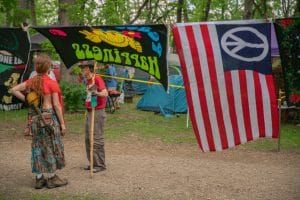
The music started at noon on the main stage with a band called Armchair Boogie. Hailing from Wisconsin, they play high energy bluegrass that could be considered progressive, given the myriad of influences involved in their sound. I’d seen them a few months back at the Nomad, and it was fun to see them play a bigger stage. They had a drummer and electric bassist, which is somewhat atypical for a bluegrass band, but the extra instruments helped to fill out their sound. They also played the first of many covers I’d see throughout the festival, an interesting take on My Morning Jacket’s “Outta My System.” Later in the set, they brought out a few guests to help them in the form of festival artist-at-large Joe Marcinek, and Kind Country’s Max Graham. Both added to what amounted to a solid opening set.
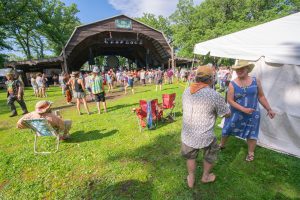
St. Louis’ Grass Fed Mule was next on the other stage, called the Harmonium. They are also a Bluegrass band, albeit one cut from a slightly different cloth. Though they had some progressive and jammy tendencies, their strength was in the songs, which were concise, well written, and thoughtful. Much to their credit, the slow songs they played worked just as well as the fast ones, and the singing was on point. With that said, their guitarist/mandolin player could really pick, and seemed to get better as the set went on. One of the best parts of festivals is checking out new bands you wouldn’t normally encounter, and these guys made a strong impression
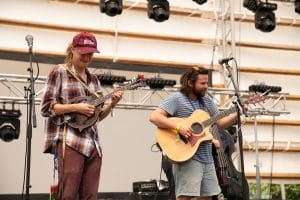
Of course, There’s more to festivals than just music. Part of the fun of festivals is the sheer joy of being outside for a few days. While this is usually a positive, occasionally mother nature will play a dirty trick and interfere. This was, unfortunately, the case around three o’clock on Friday, as a passing rainstorm delayed Blues singer Samantha Fish’s (also a Missourian) highly anticipated set. Any rain at a festival is a bummer, but this was a letdown of a bigger magnitude, as there has been quite a buzz about Fish as of late. Thankfully, the rain eventually relented and we were treated to what was easily one of the best sets of the weekend. Fish instantly established herself onstage as an ideal rock/soul/blues frontwoman, shredding through song after song, which varied stylistically while maintaining cohesion. The set was focused and blistering with a bluesy edge, and the band, which included a horn section, was tighter than any at the festival. If anybody in the crowd needed to shake off Thursday night’s partying, or Friday morning’s drive, this set did the trick. While it was disappointing that she played a shortened set, the crowd left knowing they witnessed an artist perform at a high level. The energy and tone that she established would last all night and beyond.
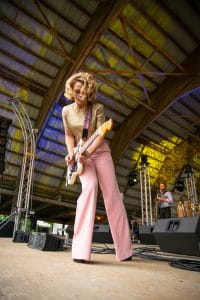
Samantha Fish wouldn’t be the only casualty of the weather. Following her brief set on the main stage and a few from local bands on the Harmonium, the stage was set for another highly anticipated performance, this one from New Orleans mainstay Jon Cleary. Originally from London, Cleary is a piano and keyboard player who has been active in the Crescent City for decades and recently won his first Grammy. To the disappointment of myself and many others, winds and rain picked up again mere minutes before he was set to take the stage with his trio, forcing another delay. As before, people retreated to their campsites while the storm passed.

The show eventually did go on. Once the storm passed, Cleary and his band took the stage, bringing with them a vibe and sound that nodded heavily towards their hometown while remaining distinctively their own. The set was smoking, with elements of R&B, funk, and soul combining to rally the crowd into a fervor. Interestingly enough, Cleary played guitar for about half of the set. Initially, I didn’t know what to expect, but he proved to be proficient enough and delivered some of his better songs coming during this part of the set. Notable standouts included “Boneyard,” and “Just Kissed my Baby,” the latter of which included an a capella scat breakdown by all members of the band, the only one of its kind at the festival. The band was as good as one could hope for, and broke out into a few monster jams towards the end of their set.

As talented as Cleary and company were, though, they weren’t the funkiest band of the night. That title went to Cory Wong and the Green Screen Band. Wong, associated with funk powerhouses Vulfpeck, is based locally and is one of the best guitarists in town. His band, which included a horn section, was more than up for the task. I walked into the set about 20 minutes into a dance party of the greatest degree.
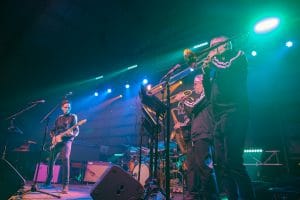
Facilitated by the chops of the band, and Wong’s sense of humor (he made a lot of music theory related jokes), the set was one of the most purely entertaining of the festival, and was aided by the appearance of another key Vulfpeck contributor, Antwaun Stanley, who came onstage about halfway through. Immediately assuming the role of frontman, Stanley wasted no time taking charge, singing through tracks like “Express Yourself,” and “Love and Happiness,” with a pervasive charisma. Stanley fit in well with the rest of the band’s sound, and left the crowd wanting more.
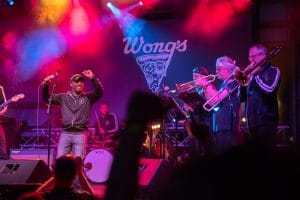
Headlining Friday night was Leftover Salmon, a Bluegrass oriented jam band from Boulder. A festival circuit favorite, the veteran band took the stage at about 10:30 for a long and eclectic set of originals, with a few covers mixed in. The set was strong, with long, funky jams that moved between low key and more intense fare. The vocals weren’t my favorite, but the musicianship was solid on all fronts. Particularly skilled was banjo player Andy Thorn, whose solos were impressive and diverse. My favorite part of the set was the encore, which included two Little Feat songs in “Willin,” and “Don’t Bogart that Joint.”

Saturday
With a strong first day in the books, Saturday looked promising. With Phil Lesh’s headlining set following several big names locally and nationally, the day had the potential to be the centerpiece of the whole weekend. With mother nature in check for the day, the shows went off without a hitch, bringing another impressive and eclectic day of music to Harmony Park.
Music Saturday started at around noon, but I didn’t catch my first set until a few hours later, at the Harmonium stage around two, with the only local tribute act on the bill, a group of musicians paying tribute to the Allman Brothers, calling themselves the Brothers Allmanac. People tend to have strong opinions on tribute acts one way or another, but mine is simple: If they’re good, I’ll enjoy it, and if they’re not, I probably won’t. This becomes increasingly true the more I like the band they’re paying homage to. With that in mind, the stakes were pretty high for this show, as I’m a huge Allman Brothers fan, having grown up with their music, and listened to it for years on the radio and on my iPod. Fortunately for all involved, these guys were good, pulling off with apparent ease what are ostensibly the hardest parts of covering a band as complex as the Allmans, from the jazzy two drummer rhythmic attack to the unique guitar harmonies that defined them for decades. On top of that, they could sing. Not as well as Gregg Allman (very few approach that), but well enough to get by and create an enjoyable experience for the audience. Amidst a sea of new and unfamiliar music, it’s always fun to reconnect with the familiar, and for me, this set was just that. It was great watching the group jam out classics like “Dreams,” “In memory of Elizabeth reed,” and “One way out,” which saw Joe Marcinek join the band. It was another positive start to another long day of music.
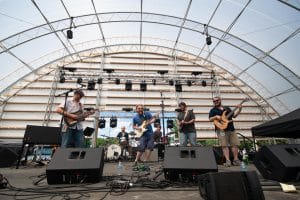
Saturday rolled on with a set by San Francisco’s Midnight North. Led by Grahame Lesh (the son of Phil), and Elliott Peck, the band played an enjoyable, and highly listenable blend of rock and Americana that occasionally flirted with country. More so than some other bands on the bill, the focus here was on songcraft, vocals, and harmony, which made for a smooth set. While they did display instrumental chops (Grahame especially), Peck’s voice stole the show, effectively covering lots of ground stylistically. Also cool was to see the band switch instruments from time to time, a move that can feel gimmicky at times, but didn’t in this instance. The sound was organic, smooth, and soulful, and a change of pace, the exact combination you want to have in the middle of the day at a sweltering hot festival.
Another one of the great parts of festivals (there are many) are the surprises. Unexpected covers, interesting sit ins, and shaken up setlists are some of the many occurrences at festivals that can catch you off-guard and enhance your experience. Sometimes you hear something you’ve never heard before and have no choice but to engage, be it by dancing, or simply listening. One of these moments occurred, for me, at the Harmonium stage in the early evening on Saturday, at the hands of a jazz trio dubbed “Clouser-Medeski-Bates,” consisting of Todd Clouser, John Medeski, and JT Bates. There’s a strong chance you’ve heard those names before, as all three are highly respected musicians with long, and illustrious careers. Pound for pound, this was probably the most talented band at the festival, but going in I was unsure of what to expect given that they play together so little (I believe this was only their second formal gig), and cover so much ground stylistically in their various projects. The results were, to say the least, interesting. The set fell under the jazz umbrella, though it was propulsive like rock at times. Calling it fusion would probably be taking a step too far. There were vocals at times, and songs were played, but much of the set was spent improvising within and outside of the unconventional song structures in play. This wasn’t a bad thing, however, as the trio had great chemistry. This was to be expected, as each member has spent considerable time improvising in their respective careers. The improvisation, in this instance, wasn’t indulgent or boring but rather collective and exciting, with each member working hard to make the whole better. Bates, specifically, was on fire. I’d seen him before (He’s based in the cities) in various contexts, but never unhinged like this. He never repeated the same sound, rhythm, or motion twice, and the set appeared to be a full body exercise for him, as he was constantly in motion, showing why he’s one of the most sought-after drummers in the state. Clouser and Medeski were no slouches either, each showing they belonged in such a prestigious trio. The set was challenging, and far from straightforward or melodic, but worked as a real treat for the diehard music fans at the festival.
Changing the pace yet again was a set by Twiddle on the Mainstage. A jam band from Vermont, Twiddle had a melodic sound with long jams. Some of these jams were engaging while a few fell flat. Mihali Savoudlidis proved to be worthy of his status as front man of the up and coming band, playing dynamic guitar solos that spanned several genres, touching on reggae, rock, hip hop, jazz and more. His distinctive voice and strong playing kept things interesting, and will likely ensure their star continues to rise nationally in the jam band circuit. The centerpiece of the set was “Syncopated Healing,” which, along with being one of the bands signature songs, proved to be an excellent jam vehicle, clocking in at over 10 minutes without ever losing focus. Another pleasant surprise came in the form of a sit in, from Midnight North’s aforementioned Grahame Lesh and Elliott Peck, who sat in on “White Light,” and Jimmy Cliff’s “The Harder they Come,” the latter of which brought a reggae vibe.

The last act of the day before the headliner was Minnesota’s own Kind Country. A live favorite of many in the region, the band plays progressive bluegrass, complete with jams, long virtuosic solos, and strong originals while incorporating influences from far and wide. While the band has many strengths, the most underrated part of Kind Country is its song writing. They aren’t unbelievable singers, but the songs they write are well crafted, well delivered, and beautiful. That’s not to say they aren’t great musicians, however. Max Graham (mandolin) is one of the best pickers in the region, and the others aren’t far behind. Their set saw tight jams, sweet solos, and delightful harmonies. They’ve long had the reputation of a band worth seeing, and this set did nothing to dispel that notion.
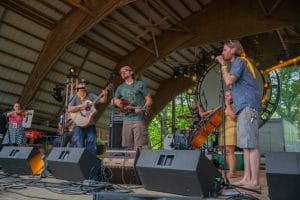
While three long days of solid sets is nothing to scoff at, a headlining set can make or break a festival. If a headliner disappoints, it can turn a great day to “meh,” or a “meh” day to a bad one. For 2018’s festivities, Revival tapped Phil Lesh, bassist extraordinaire of Grateful Dead fame, along with his Terrapin Family Band to headline. Phil is their biggest booking yet, and the excitement amongst festival goers was palpable throughout the day. Like many, I’ve been a Dead fan for a long time, and traveled great distances to see various Dead affiliated projects over the years. This however, would be my first time seeing Phil, or any member of the Terrapin Family Band. For that reason and others, this had the potential to be an important set, even more so than your average festival headliner. Over the course of two sets, Phil and his solid band celebrated the legacy of the Grateful Dead while pushing the music forward, where it’s always been.
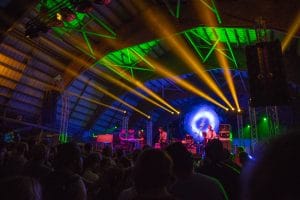
Set one started the way I like my dead shows to start: with an upbeat, and danceable leadoff track that everybody knows. On this occasion, that track was Bertha. It engaged the audience immediately, and showcased the talents of the band, including the singing of his son Grahame (one of the hardest workers of the day), and the many sides of keyboardist Jason Crosby. After their strong start, the band kept things up, gliding through “West L.A. Fadeaway,” and “New speedway Boogie,” the latter of which had been covered by Leftover Salmon the night before. The jams went long, but that was ok, the band took their time without losing the audience. Phil’s playing was as dexterous and interesting as ever, and he shined in the fills on “Scarlet Begonias,” shedding light on why everyone was so happy to see him in the first place. He took the lead on a strong “Mississippi Half Step,” which also saw Grahame playing an excellent slide, and closed the set by singing one of everybody’s Phil favorites, “Box of rain,” off of the Dead’s classic American Beauty.
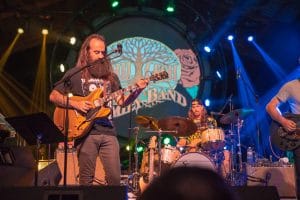
Set two was another doozy. Opener “Mason’s Children” segued into the well-sung “He’s Gone,” which segued back into a particularly abstract take on the always abstract “The Other One.” Each member took the spotlight at various points, but the best points in the set were when guitarist Ross James took over. This was especially true in “Unbroken Chain,” seemingly an unlikely candidate for a second set highlight, which really engaged the crowd. He proved to be the breakout star of the set, and his interplay with Crosby on “The Wheel” really stood out. While Ross was great, this show was a full band effort, which made their encore cover of The Band’s “The Weight” all the more special. Nearly everybody took a verse, and the band showed they were more than worth their headliner status.

Sunday
The last day of a festival always comes with difficulties. Many are tired after days of standing, dancing, and partying, and others simply have a hard time leaving the world they’ve called home for the last half week or so. Revival proved no different, as the temperature neared ninety-five degrees. There were times when air conditioning and the comforts of modern living sounded like a nice alternative to festival life. With that said, Sunday brought more great music to the festival, which helped myself and the audience power through and finish the festival strong.
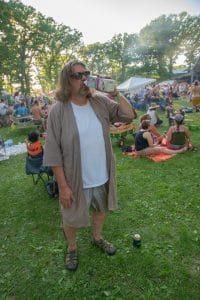
The first band I caught Sunday was the Last Revel. A Minneapolis roots and bluegrass band, they’ve accrued a big following over the past few years, which culminated in a sold-out show at the Turf Club a few months back. Since then, they’ve continued to tour the country and recently announced a lineup change. This proved to be an interesting dynamic, as new singer/guitarist Rachel Hanson joined the band for most of the set. On the backs of their strong original songs, the band delivered a performance worth remembering
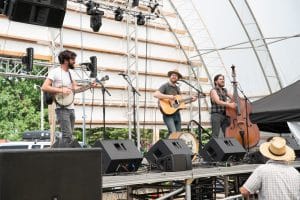
Amy Helm was next. Amy, the daughter of Levon Helm (of The Band fame), brought her soulful sound to the Mainstage. It was a tough slot to play, as it took place on day three of the festival in the extreme heat, but Amy distinguished herself with excellent songs, and a soulful voice equally adept at handling blues, soul, and folk music. I took this time to relax on the shaded lawn and take in the sweet sounds, but she had plenty of people dancing, despite the heat, which was a feat in and of itself.
Late afternoon Sunday brought one of the more interesting acts of the festival to the harmonium stage. A popular local rock band I wasn’t familiar with before the festival, Dead Larry, played a brand of music distinct from anyone else at the festival. The best way I could describe them is eclectic-they write wacky, irreverent songs, and those hard-rocking songs take unexpected and occasionally bizarre left turns. There was occasional shouting on the stage (their first song featured lots of shouting about “raging.”). The vibe they brought was different, to say the least, and didn’t always agree with me. With that said, the rest of the audience seemed to get a lot out of the set. It’s clear that Dead Larry has a devoted fan base, and that many of those devoted fans were in the audience at Revival.

Another local act with a big cult following followed on the main stage. Useful Jenkins, a rock and jam band with bluegrass instrumentation, played through their fan-favorite record, 2012’s Festival express. They weren’t on my radar going in to the festival, but they produced big-time, with lots of energy, tight jams, and songs that the audience knew every word to. In an eclectic festival with plenty of eclectic bluegrass bands, they probably had the strongest audience response, which was no small feat. The end of their set also saw one of the more unexpected covers of the festival, a take on Nine Inch Nails’ dirty industrial funk hit “Closer.” The crowd danced and sang along in approval, as they had for the entire set.

The final “National” act of Sunday, and the entire festival took the main stage at around 8PM on Sunday. This was festival circuit hero Keller Williams. Keller, a one-man band who does most of his damage via looping pedals and multiple instruments, has always been a unique contributor to the diverse “jam band” ecosystem. Known for his sense of humor as well as his instrumental prowess and thoroughly quirky approach to improvisation, Keller has been a fixture on the scene for two plus decades.

On this day, Keller played two consecutive sets, one by himself, and one accompanied by his bluegrass band, The Keels.
Keller’s solo set was vintage Keller, with long, loop-heavy jams, funky bass lines, and a funny song about festivals (this was very meta). It was short on melody, but the grooves were strong enough to carry the set. The set was fun to watch, and especially fun to break down in the moment.

Once the Keels (Flatpicker Larry Keel and his wife, bassist Jenny Keel) joined him on stage, the tone of the show changed. While Keller and the Keels did jam (and well), the set was more song-oriented than Keller’s solo set. Many of these songs were covers, and they ran the gamut stylistically, from older artists like The Eagles (“Seven Bridges Road”), and the Doors (“Roadhouse Blues”), to newer artists, like Ryan Adams (“Cold Roses”). My favorite was a bluegrass take on Patterson Hood’s “Uncle Disney.” The song is well-written, but becomes fully realized when fleshed out as a bluegrass song. Adding to the mix was Keller’s dexterous voice, which was impressive across the board. His broad vocal range, both low and high, was on full display during the set. His sets were rejuvenating, and gave the audience fuel to finish strong.

Closing out the Harmonium stage was Twin Cities favorite Frogleg. A jam band for all intents and purposes, Frogleg has emerged as one of the more popular live acts in the region over the past few years. I’ve seen them a few times, with mixed results. This isn’t to say that I haven’t liked their playing or songs, it’s more that I’ve seen in some weird venues playing to unreceptive crowds. This has been disappointing, because the band can really play, and there’s been a palpable buzz around them for a while.

This set would prove to be a good one though. The band was tight, with their dual-drummer attack propelling their sound into unanticipated directions, and their front men ripping off solo after solo, without overindulging. Their originals felt well-paced and well-written, and the few covers they chose were wide-ranging and fit in well with the rest of the set. There was a lot of discussion in the audience about the future of Frogleg, specifically relating to how high they can climb on the proverbial food chain. While you can’t predict the future. It’s clear that this young band is already playing at a high level. Their stock is only rising, and that’s something the whole scene should be grateful for.
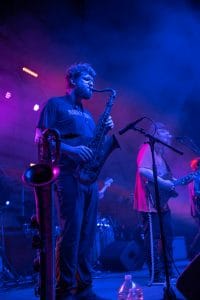
Closing out the Festival were Minnesota rock institutions The Big Wu. An appropriate choice given their sonic sensibilities and local roots, the Wu gave one of the better performances I’ve seen in my many years of watching them. Mixing old favorites with newer songs, the band ended the festival with a bang. While the set was solid front to back, the highlight for me was the newer “We are Trees,” which they played early in the set. I’d heard it live before, but this was as good as it has sounded. Even during an average show, it’s fun to watch Chris Castino and Mark Joseph play guitar, and on this night their shredding was on another level. They finished with an appropriate cover, a take on the Traveling Wilbury’s “End of the Line.” It was the end of the festival, but if I learned one thing over the weekend, it’s that the spirit of rock music endures.


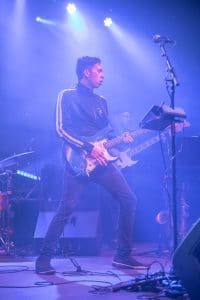
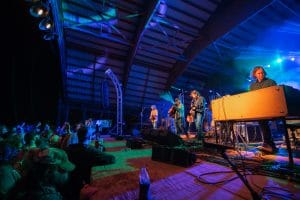







Comments
0 comments